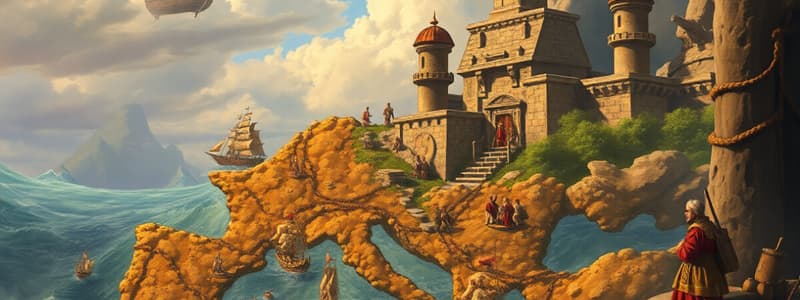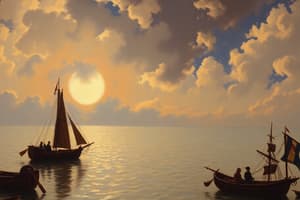Podcast
Questions and Answers
What encouraged a new spirit of adventure and curiosity in Europe during the early 1400s?
What encouraged a new spirit of adventure and curiosity in Europe during the early 1400s?
- The Industrial Revolution
- The Black Death
- The Crusades
- The Renaissance (correct)
What was the primary motivation for European exploration?
What was the primary motivation for European exploration?
- To find new sources of wealth (correct)
- To spread democracy
- To discover new continents
- To study different cultures
Which Italian trader reached the court of Kublai Khan in China?
Which Italian trader reached the court of Kublai Khan in China?
- Marco Polo (correct)
- Christopher Columbus
- Ferdinand Magellan
- Vasco da Gama
What did Europeans hope to gain by finding a sea route directly to Asia?
What did Europeans hope to gain by finding a sea route directly to Asia?
What commodity from Asia was in high demand in Europe?
What commodity from Asia was in high demand in Europe?
Besides wealth, what was another significant motivation for European exploration?
Besides wealth, what was another significant motivation for European exploration?
What event heightened feelings of hostility between Christians and Muslims?
What event heightened feelings of hostility between Christians and Muslims?
Before the 1400s, what limited European exploration?
Before the 1400s, what limited European exploration?
What type of ship was developed in the 1400s that was sturdier than earlier vessels?
What type of ship was developed in the 1400s that was sturdier than earlier vessels?
What instrument, perfected by Muslims, did sailors use to determine their location at sea?
What instrument, perfected by Muslims, did sailors use to determine their location at sea?
The magnetic compass was invented in which country?
The magnetic compass was invented in which country?
Which European country was the first to establish trading outposts along the west coast of Africa?
Which European country was the first to establish trading outposts along the west coast of Africa?
Which explorer convinced Spain to finance a voyage to find a route to Asia by sailing west?
Which explorer convinced Spain to finance a voyage to find a route to Asia by sailing west?
What motivated the Spanish monarchs to seek a direct sea route to Asia?
What motivated the Spanish monarchs to seek a direct sea route to Asia?
What was the immediate impact of Columbus's voyage?
What was the immediate impact of Columbus's voyage?
What did the Treaty of Tordesillas accomplish?
What did the Treaty of Tordesillas accomplish?
Flashcards
The Renaissance
The Renaissance
A period that spurred a renewed interest in adventure and discovery among Europeans.
Desire for wealth
Desire for wealth
Motivated European exploration in the 1400s.
Spices
Spices
A major trade item from Asia that Europeans desired.
Muslims >> Italians >> Merchants
Muslims >> Italians >> Merchants
Signup and view all the flashcards
Direct sea route to Asia
Direct sea route to Asia
Signup and view all the flashcards
Spread of Christianity
Spread of Christianity
Signup and view all the flashcards
The Crusades
The Crusades
Signup and view all the flashcards
Converting non-Christians
Converting non-Christians
Signup and view all the flashcards
What is a caravel?
What is a caravel?
Signup and view all the flashcards
What were the primary motives for European exploration?
What were the primary motives for European exploration?
Signup and view all the flashcards
What is an astrolabe?
What is an astrolabe?
Signup and view all the flashcards
What is a magnetic compass?
What is a magnetic compass?
Signup and view all the flashcards
What does latitude measure?
What does latitude measure?
Signup and view all the flashcards
Which European country first established trading outposts in Africa?
Which European country first established trading outposts in Africa?
Signup and view all the flashcards
Who was Christopher Columbus?
Who was Christopher Columbus?
Signup and view all the flashcards
Which country financed Columbus's voyage?
Which country financed Columbus's voyage?
Signup and view all the flashcards
Spanish Motivation
Spanish Motivation
Signup and view all the flashcards
Columbus's Impact
Columbus's Impact
Signup and view all the flashcards
Line of Demarcation
Line of Demarcation
Signup and view all the flashcards
Treaty of Tordesillas
Treaty of Tordesillas
Signup and view all the flashcards
Later European Powers
Later European Powers
Signup and view all the flashcards
Limited inland impact
Limited inland impact
Signup and view all the flashcards
English and Dutch challenge
English and Dutch challenge
Signup and view all the flashcards
First countries to explore in Asia.
First countries to explore in Asia.
Signup and view all the flashcards
Study Notes
- By the early 1400s, Europeans were ready to venture beyond their borders.
- The Renaissance encouraged a new spirit of adventure and curiosity, prompting Europeans to explore the world.
- In the 1100s, European crusaders battled Muslims for control of the Holy Lands in Southwest Asia.
- In 1275, Italian trader Marco Polo reached the court of Kublai Khan in China.
- Before 1400, Europeans had not been completely isolated from the rest of the world.
- Europeans initially lacked the interest or ability to explore, which changed by the early 1400s.
Desire for New Sources of Wealth
- Merchants and traders hoped to profit from overseas exploration, specifically the trade of spices and luxury goods from Asia.
- The pursuit of wealth was the main driver for European exploration.
- Wars between Christians and Muslims introduced Europeans to spices like nutmeg, ginger, cinnamon, and pepper, which added flavor to their food.
- Trade Route: Muslims -> Italians -> Merchants
- High prices motivated the search for a direct sea route to Asia.
The Spread of Christianity
- The desire to spread Christianity also motivated Europeans to explore.
- European countries believed they had a sacred duty to fight Muslims and convert non-Christians worldwide.
- They aimed to obtain goods directly from Asia while also Christianizing the people there.
Advances in Technology
- In the 1400s, shipbuilders designed the caravel, a new and sturdier vessel.
- Triangular sails adopted from the Arabs allowed caravels to sail effectively against the wind.
- "God, glory, and gold" were the primary motives for exploration, and advances in technology made voyages of discovery possible.
- The astrolabe, perfected by Muslims, helped sailors determine their location at sea using rings marked off in degrees to sight the stars and calculate latitude.
- Explorers used the magnetic compass, a Chinese invention, to track direction accurately.
Portugal
- Portugal was the first European country to establish trading outposts along the west coast of Africa.
- Portuguese explorers eventually pushed farther east into the Indian Ocean.
- Portugal led in developing and applying sailing innovations.
Spain
- Christopher Columbus, an Italian sea captain, convinced Spain in 1492 to finance a plan to find a route to Asia by sailing west across the Atlantic Ocean.
- As the Portuguese established trading posts in Africa, Spain sought a direct sea route to Asia.
- Columbus reached an island in the Caribbean, opening the way for European colonization of the Americas.
- Columbus's voyage increased tensions between Spain and Portugal, as both aimed to reach Asia.
- Columbus believed he reached the East Indies, but he had reached America
Line of Demarcation
- Pope Alexander VI proposed an imaginary dividing line through the Atlantic Ocean to keep peace between Spain and Portugal.
- Lands west of the Line of Demarcation belonged to Spain, including most of the Americas.
- Lands east of the line belonged to Portugal.
Treaty of Tordesillas
- In 1494, Spain and Portugal signed the Treaty of Tordesillas.
- Both countries agreed to honor the Line of Demarcation.
- The era of exploration and colonization began in earnest.
- Portugal complained the line favored Spain.
- The line was moved west to include modern-day Brazil for Portugal.
European Trade
- In the 1600s, the English and Dutch began challenging Portugal's dominance over the Indian Ocean trade.
- By the 1700s, Britain and France had gained a foothold in the region.
- The Dutch are also known as the Netherlands.The Portuguese and the Spanish were the first to explore in Asia, but they were not the only ones.
- Europeans battled for Indian Ocean trade, but their inland influence in Southeast Asia remained limited.
- European traders controlled many port cities, but their impact rarely spread beyond the ports.
- From 1500 to about 1800, the peoples of Asia remained largely unaffected by European contact, even as Europeans began to conquer much of the region.
Studying That Suits You
Use AI to generate personalized quizzes and flashcards to suit your learning preferences.




